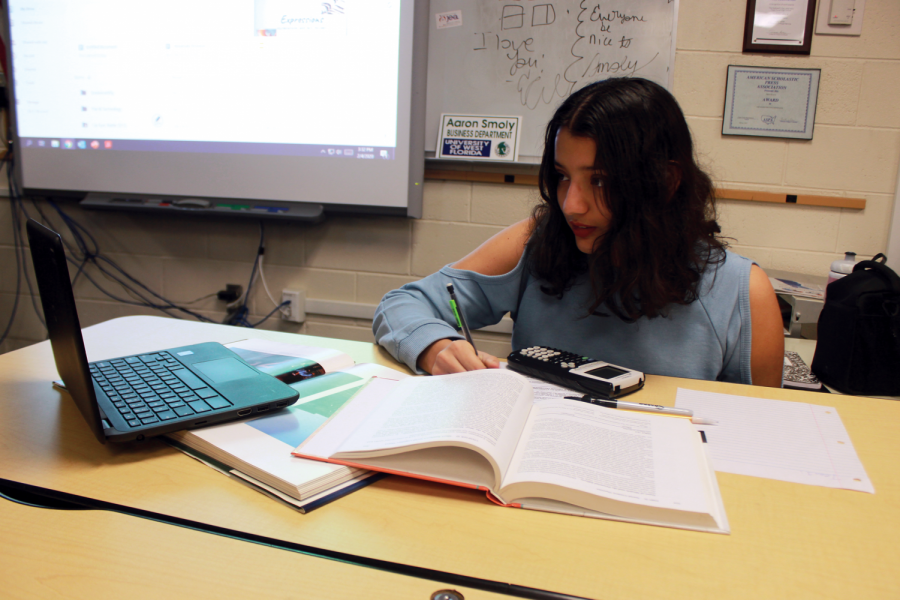ACT announces major changes in testing
Testing Takes a Turn: Elisabet Ortiz studies at the table for the ACT.
By this point in the school year, most high school seniors are awaiting the release of college decisions, and college prep is a fading nightmare of the past. For juniors, the panic associated with standardized testing is now slowly beginning to set in; however, in the upcoming school year, they may be getting an advantage previous test-takers never had.
ACT, Inc. has announced that beginning in September 2020, they will be allowing section retakes and online testing.
For many students, the most revolutionary may be the section retake. After first taking a full test, students will be given the opportunity next time to retake specific subject areas of their choosing, administered on the same days as the national tests.
This could prove to be a major advantage for students, as they could focus their time and resources on studying for one or two subjects they may have fallen short on without the pressure of having to study the subjects for which they already earned satisfactory scores.
“I think if the ACT would have been divided up, I would have been able to concentrate on studying for one section per testing day, and that would have made my life a lot easier instead of having to study for everything all at once,” said senior Elisabet Ortiz, a two-time ACT veteran.
The section retakes may also become an advantage for Florida students who are finding means to graduate. In order to graduate, students must pass the 10th grade FSA Reading test; however, if they don’t, they can also aim for a concordant score on the ACT Reading (score of 18 or 19) which would make them eligible for graduation.
Katelyn Uhler, the IB Coordinator at Cape High, believes this may facilitate the needs of many students in the school. “As a proctor [for the ACT], I’ve seen students come in and only care about the reading section because they just want that concordant score. And so they’ll just kind of flop off the rest of the test or sleep because all they really cared about was the reading [section],” she said. “If they can go in and just take the reading, that would be nice for them.”
ACT, Inc. has confirmed that the section retakes will be cheaper than taking the full test, which will relieve some of the financial burdens that standardized tests put on families. This school year, the ACT costs $52 per session or $68 with writing.
Standardized testing has always been accused of being inherently advantageous for the wealthy. However, over the years, measures have been taken in order to level the playing field. The ACT offers four fee waivers for financially eligible students, and the full ACT Online Prep, which normally costs $39.95, is included in the waiver.
Online preparatory courses such as this will be ever more in demand due to ACT’s introduction of national online testing.
A huge perk of online testing is the ability to receive scores much earlier. Multiple-choice scores for the ACT generally takes at least two weeks, and at most eight weeks, to become available to view by the student. However, an online test will only take two business days for scores to be available, vastly condensing the time in between.
“I think it would greatly benefit students because then they know whether or not they need to retake tests right away, as opposed to waiting a month to get scores and may be missing a deadline for another test,” Uhler said. “To apply to colleges, a lot of times they (the students) are trying to get these scores in before the deadline. If they can get them right away, it wouldn’t be such a stress and burden.”
Cape Coral High School was selected last year in December to participate in a study for the new online ACT mode, in which 75 juniors were given waivers to take the ACT both online and on paper. The test at Cape High was conducted by Debby Kudla, the CCHS Technology Support Specialist and test center supervisor.
Overall, Kudla was on board with the new mode of testing. “The teachers who tested with the online [group] loved it; it went nice and smooth,” she said. “The students did well because they’re so used to testing online.”
However, Kudla did have some concerns. “If the students were to bring their own Chromebook, one-on-one, how would that go?” she said. “If I’m expected to have enough laptops on hand for them, what is the maximum limit to how many students can test?”
As of writing, ACT, Inc. has yet to release all the information on the new changes such as the results of studies concerning section retakes and online testing. In any case, the changes only serve to benefit students, so those who strive for success can only use it to their advantage.
Your donation will support the student journalists of Cape Coral High School. Your contribution will allow us to purchase equipment and cover our annual website hosting costs.








